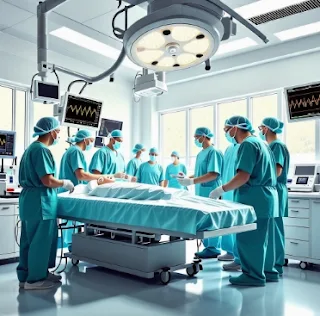Organ Transplant Success Rates and Latest Technological Trends
1. Organ Transplant Success Rates
1.1 Basics of Organ Transplantation
Organ transplantation involves replacing a damaged organ in a patient with a healthy organ from a donor. The success rate of a transplant depends on numerous factors, including the type of organ, the patient’s overall health, surgical techniques, and immunosuppressive therapy.
1.2 Statistics on Organ Transplant Success Rates
Success rates for organ transplants have been improving over time. For example, the 1-year survival rate for heart transplants exceeds 90%, and the 5-year survival rate for kidney transplants is about 85%. These statistics reflect improvements due to ongoing research and advancements in technology.
1.3 Key Factors Affecting Success Rates
Several key factors influence the success rate of organ transplants:
- Health of the Donor Organ: The health of the donor's organ is crucial for a successful transplant.
- Patient’s Overall Health: The patient must be in good overall health and adequately prepared for the transplant.
- Post-Transplant Care: Proper use of immunosuppressants and regular follow-up care are essential for success.
2. Latest Technological Trends in Organ Transplantation
2.1 Advances in Immunosuppressive Drugs
Immunosuppressive drugs are critical in preventing the rejection of transplanted organs. Newer immunosuppressive medications are being developed to minimize side effects and improve transplant success rates. Recent developments include personalized immunosuppressants based on genetic information.
2.2 Organ Regeneration Technologies
Organ regeneration technologies aim to restore damaged organs naturally. Research involving stem cells is progressing, and this technology could address the shortage of organ donors if commercialized.
2.3 Artificial Organs and Bioprinting
The advancement of artificial organs and bioprinting technologies is poised to revolutionize organ transplantation. Research is underway to create patient-specific organs using 3D printers, which could alleviate the shortage of donor organs.
2.4 Robotic Surgery and Minimally Invasive Techniques
Robotic surgery and minimally invasive techniques enhance the precision and safety of organ transplantation. These technologies reduce recovery times, decrease patient pain, and minimize complications.
3. Ethical and Social Considerations in Organ Transplantation
3.1 Ethical Issues in Organ Donation
Ethical issues related to organ donation are significant in the field of transplantation. Voluntary donation from the donor and family consent are fundamental principles. Legal safeguards must be in place to protect the rights of organ donors.
3.2 Economic Burdens of Organ Transplantation
The economic burden associated with organ transplantation can be stressful for patients and their families. Costs include the surgery, ongoing immunosuppressive medication, and post-transplant care. Government and societal support are essential.
4. Future Prospects and Research Directions
4.1 Future of Organ Transplantation Technologies
Future organ transplantation technologies are expected to be increasingly innovative. Advances in artificial organs, bioprinting, gene editing, and stem cell research will enhance success rates and address the organ donor shortage.
4.2 Importance of Personalized Treatments
Personalized treatment is becoming increasingly important in organ transplantation. Tailoring treatment and immunosuppressive drugs based on genetic analysis and individual health conditions will significantly impact transplant success rates.
4.3 Global Collaboration and Research
Global collaboration and research are crucial for advancing organ transplantation technologies. International research networks and cooperation will accelerate technological advancements and improve transplant success rates worldwide.
Conclusion
Organ transplantation is a vital medical technology that saves lives and improves quality of life. The latest technological trends and research findings continuously enhance success rates, and future technologies promise even more innovation. However, ethical issues and economic burdens remain challenges. The future of organ transplantation will be shaped by personalized treatments and global collaboration.
This article aims to deepen your understanding of organ transplant success rates and the latest technological trends and to raise awareness in related fields. Keeping up with the latest information and research in organ transplantation is crucial.

